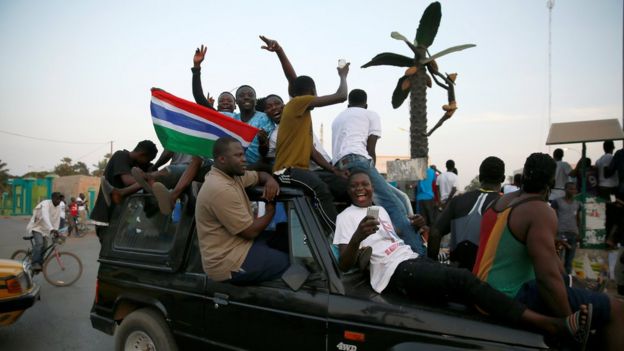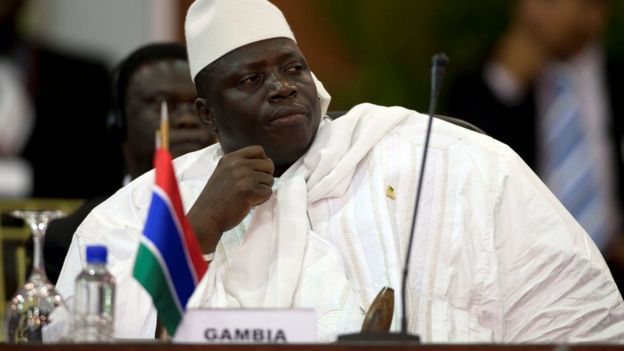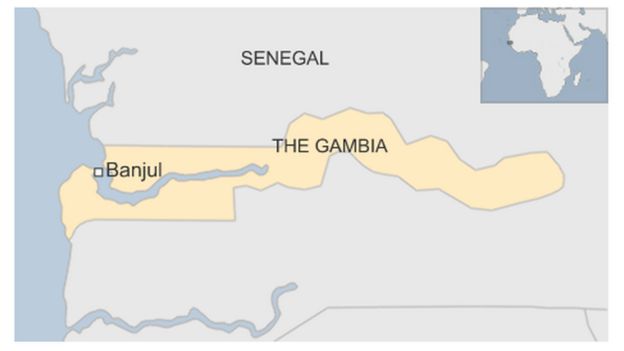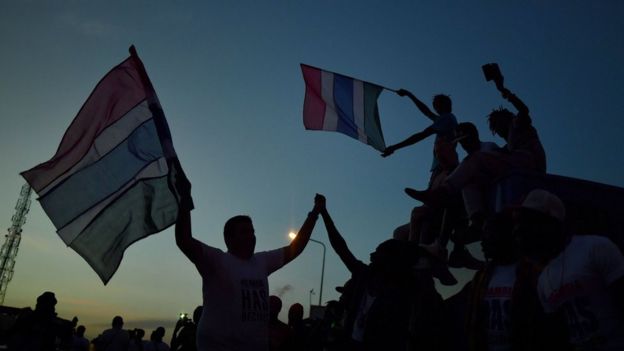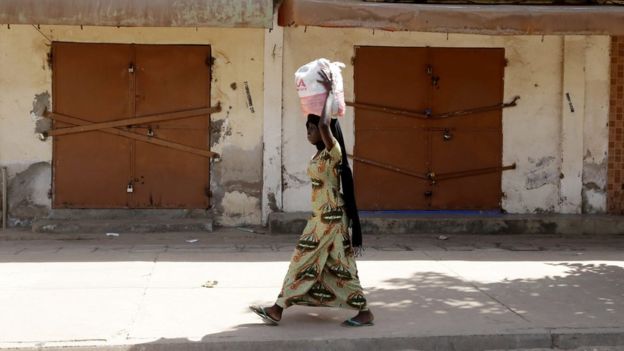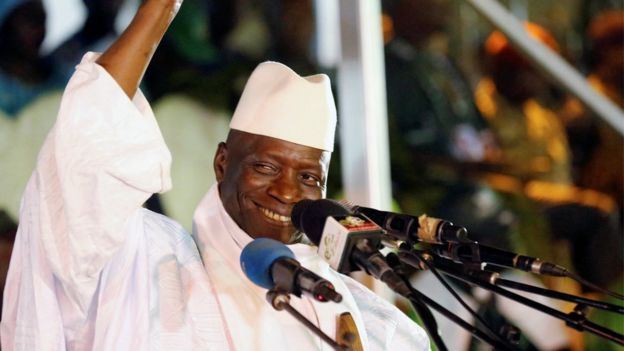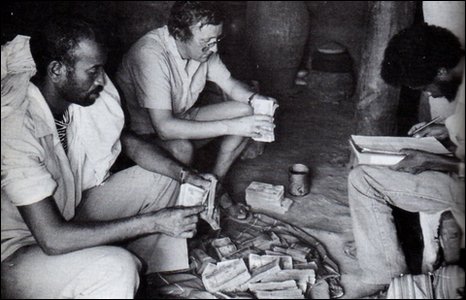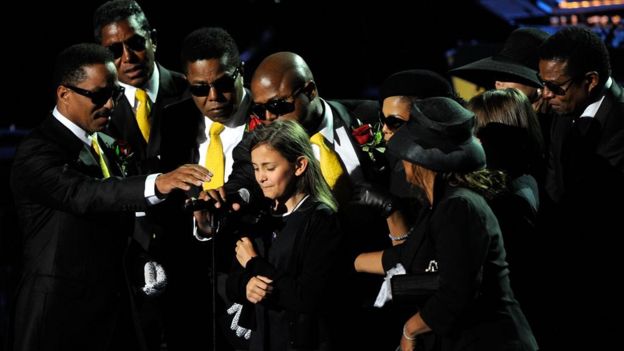By Prof. Alemayehu G. Mariam
![]() The T-TPLF (Thugtatorship of the Tigrean People’s Liberation Front) is out in full force once again on its annual panhadling circuit.
The T-TPLF (Thugtatorship of the Tigrean People’s Liberation Front) is out in full force once again on its annual panhadling circuit.
In January 2016, the T-TPLF was out peddling for food aid and blaming the West for being ungenerous.
For the past one-quarter century, the T-TPLF has been panhandling in the name of the Ethiopian people.
Aaah! So mortifying to listen to the annual chatter of beggars’ teeth.
Last week, the T-TPLF Disaster Commissioner Mitiku Kassa yelped to the international community to cough up “USD$948 million in aid” because “we are facing a new drought”.
That is the same Mitiku Kassa who in 2010 declared, “In the Ethiopian context, there is no hunger, no famine… It is baseless [to claim hunger or famine], it is contrary to the situation on the ground. It is not evidence-based. The government is taking action to mitigate the problems.”
In May 2016, Dr. Alex DeWaal, Executive director of the World Peace Foundation at Tufts University and a longtime associate of the T-TPLF also declared: There is “no famine in Ethiopia… Ethiopians aren’t starving to death… People aren’t dying… Animals are dying of thirst…”
In 2017, there is aggravated famine in Ethiopia; and the T-TPLF is completely paralyzed in a state of emergency and unable to “mitigate the problem”
In his first press conference in Addis Ababa after the T-TPLF seized power, its late leader Meles Zenawi declared that the litmus test for the success of his regime should be whether Ethiopians were able to eat three meals a day. (Watch video here.)
Two decades later in 2011, Meles pompously declared, “We have devised a plan which will enable us to produce surplus and be able to feed ourselves by 2015 without the need for food aid.”
A quarter of a century after the T-TPLF seized power, Ethiopia is still in the grips of Biblical famine and endless “new droughts”.
Save the Children in its June 2014-June 2016 report stated that it was “by the middle of 2015… that the Government of Ethiopia played its fundamental role of recognizing and responding to the gravity of the loss of harvest, and lack of food and water for hundreds of thousands of families, calling on the support of the international community to prevent a terrible catastrophe.”
Simply stated, until mid-2015, the T-TPLF was asleep at the switch or just pretending “there is no hunger and no famine” in Ethiopia. Ho hum! Yawn. Another famine?!
The 2017 “U.N. Humanitarian Requirements Document”, claims in 2016 “the Government of Ethiopia, allocated more than $735 million to initiate the HRD response and to facilitate a speedy response to additional needs as the situation evolved.” It also reports, “As we turn to 2017, the number of people that require humanitarian assistance has significantly decreased from that of 2016. This is due to the positive impact of the kiremt/gu/ganna rains and the subsequent above-average meher harvest”.
So the simple question is: Why is USD$ 1 billion needed (nearly 25 percent more aid) if “the number of people that require humanitarian assistance is significantly decreased in 2017”?
In July 2016, Save the Children warned that by the end of the year, An estimated 10.2 million people, including more than 5.75 million children, will remain reliant on emergency food assistance. In 2015-16, Save the Children “programmed USD$90 million worth of relief activities.”
In 2016, the “worst drought in 50 years” is alleged to have occurred in Ethiopia “devastating eight out of 10 people who depend on farming and livestock.” Some 18 million (18 percent of the population) Ethiopians received $1.7 billion in emergency aid in 2016. (I am using the word “alleged” because I wonder if the T-TPLF and its international poverty pimp partners are using hyperbole and over-dramatization to scare and squeeze more dollars from private and governmental donors. “The sky is falling,” clucked Chicken Little as he announced the end of the world.
The U.N. Food and Agriculture Organization warns that the “impact is expected to be most dire in early 2017 among livestock, with unusually early migrations, excess mortality rates and extreme emaciation.” In April 2016, USAID Administrator Gayle E. Smith said exactly the same thing. They all share the same talking points in their unified campaign to squeeze more aid dollars from donors.
In May 2016, the T-TPLF Disaster Commissioner at a press conference with USAID Thomas Staal Acting Assistant Administrator for the Bureau of Democracy, Conflict, and Humanitarian Affairs, USAID said: “As you all know, Ethiopia has a drought which is caused by the global climate event, El Nino. The effect of the current drought is severe as compared to the 1974 and 1984 disasters. So for the drought we appealed 10.2 million people, and with regard to the resource it was $1.4 billion.”
In its 2016 humanitarian response “Mid-Year Review”, UNICEF placed the entire problem of famine on “El Niño, combined with extensive flooding, disease outbreaks and the disruption of basic public services.”
The T-TPLF and its partners are trying to blame everything on El Nino and climate change; and absolve the T-TPLF from any moral, political or legal responsibility for the recurrent famines.
I find it painfully humorous whenever the international poverty pimps circle the wagons around the T-TPLF and try to distract attention from human beings dying from lack of food to farm animals dying from lack of feed. They play these clever semantic games. The fact is that in Ethiopia and the rest of Africa, when livestock die, people also die because livestock are a primary source of household food, income and vital assets.
What is even more jarring and bizarre is the fact that in one of the “world’s fastest growing economies” nearly 20 percent of the population is facing chronic famine, year after year after year!
In July 2014, in a speech before the Committee of the U.N. Disaster Risk reduction, Disaster Commissioner Kassa said Ethiopia as “one of the world’s fastest growing economies” and the “Government of Ethiopia has put a disaster risk reduction and resilience building at the top of its agenda”. He assured the Committee that his government’s “disaster risk management approach is in line with the Hugo (sic) Framework of Action”.
The Hyogo Framework promotes strategies for “disaster risk reduction being underpinned by a more pro-active approach to informing, motivating and involving people in all aspects of disaster risk reduction in their own local communities.”
In July 2016, the T-TPLF’s puppet prime minister (PPM) Hailemariam Desalegn said:
Agricultural output during the 2014/15 meher season was better than last years, but improved 2016 belg rains saw outputs rising by seven percent. This rise impacted the entire sector, triggering a three percent growth in the same year, injecting a one to one and a half percent contribution to the overall Gross Domestic Product (GDP) of the country.
On December 27, 2016, the PPM gave assurances that Ethiopia “will register a double digit economic growth in the fiscal year as it is now on the right track of growth.” He said, “Agriculture, even though the drought situation is very huge, has shown a positive trend of growth.”
Pray tell:
If Ethiopia is developing economically by leaps and bounds and agricultural output rose “by seven percent” and the GDP grew in 2016, how is it that nearly one-fifth, and possibly more, of the Ethiopian population is facing starvation again in 2017?
If the “Government of Ethiopia” “proactively” implemented Hyogo disaster strategies, how is it that three years after Kassa’s declaration, nearly one-fifth, and possibly more, of the Ethiopian population is facing starvation again in 2017?
Famine and starvation in Ethiopia are the most important issues to me because the right to life is the bedrock of all human rights.
Article 25 of the Universal Declaration of Human Rights (UDHR) and Article 11 of the 1966 International Covenant on Economic, Social and Cultural Rights (ICESCR) recognize the right to food as the quintessential human right.
I have written countless commentaries on famine and starvation in Ethiopia. I have tried to call attention to the structural nature of famine and starvation and how the T-TPLF has used famine to profit on the misery of the famine victims and cling to power. I have even demonstrated how the T-TPLF has “weaponized famine”.
In my October 2014 commentary, “The Rise and Fall of the “Baksheesh State” (beggar state) in Ethiopia, I explained how the T-TPLF has made Ethiopia the beggar nation of the African continent. Today the T-TPLF Baksheesh State has descended into a Baksheesh State of Emergency.
The T-TPLF spreads bogus statistics (BS) like horse manure to prove that it is “transforming” Ethiopia into an African “powerhouse” and boasts that it will make Ethiopia a “middle income country by 20125.”
In my January 8, 2017 commentary entitled, “The World Bank Liars in Ethiopia”, I demonstrated how the T-TPLF coordinates and cleverly propagates BS by passing it through the World Bank and other international poverty pimps in an attempt to validate and legitimize its fake economic growth.
I have been challenging T-TPLF BS for quite a few years. But I was not alone in trying to put the T-TPLF to proof.
In 2012, The Economist called out the T-TPLF on its BS:
It is not clear how factual Ethiopia’s economic data are. Life is intolerably expensive for Ethiopians in Addis Ababa, the capital, and its outlying towns. Some think Ethiopia’s inflation figures are fiddled with even more than those in Argentina. Even if the data are deemed usable, the double-digit growth rates predicted by the government of Prime Minister Meles Zenawi look fanciful.
In other words, T-TPLF’s BS is really BS.
But the tragic fact is that in January 2017, life is even more intolerably expensive for Ethiopians in Addis Ababa, the capital, and its outlying towns!
I raise the BS issue because the T-TPLF and its partners (I did not say in crime) claim in their publicity campaigns that the T-TPLF has put in hundreds of millions of dollars towards famine relief and mitigation.
The United Nation’s International Children’s Emergency Fund (UNICEF) in its “Humanitarian Response Planning for 2017 reported: “Over the same period [2016] the Government of Ethiopia contributed ETB16.5 billion (US$735 million), including to response activities beyond the initial scope of the 2016 HRD.”
There is ABSOLUTELY not a shred of evidence to support the claim that T-TPLF put in hundreds of millions of dollars for famine relief in Ethiopia. It is just another T-TPLF BS legitimized by the poverty pimps and generally accepted as fact without any demonstrable evidence.
As most of my regular readers know, the T-TPLF coordinates its BS game with the international loaners, donors and poverty pimps. I guess the T-TPLF and its partners follow George W. Bush’s light-hearted advice: “You can fool some of the people all the time, and those are the ones you want to concentrate on.”
But what exactly is UNICEF doing in Ethiopia? UNICEF supposedly aims to “address the needs of children in the developing world”. Is that what it is doing in Ethiopia?
UNICEF claims to be “mandated” to work and collaborate with the local regimes in addressing the needs of children. The question is why UNICEF does not work with independent nongovernmental organizations, unaffiliated with regime corruptoids to help children.
There is little doubt that UNICEF’s “resident coordinators” are in the back pockets of the T-TPLF. They are determined to legitimize, justify and affirm T-TPLF actions and remain on the good side of the T-TPLF leaders. Unfortunately, it is on the basis of the reports prepared by these coordinators that UNICEF headquarters makes its decisions.
Famine in Ethiopia is the result of poor governance
The fundamental problem with famine in Ethiopia is poor governance, not drought; incompetent and indifferent governance, not environmental factors.
The recurrent famines in Ethiopia are man made; that is, they are “made” by a corrupt, indifferent, incompetent and a clueless regime that lack political will to deal with the recurrent problem. The T-TPLF leaders in Ethiopia have a petrified “bush mentality” impervious to rational planning and policy making.
On August 16, 2011, Wolfgang Fengler, a lead economist for the World Bank said it straight up: “This [famine] crisis [in Ethiopia] is man made. Droughts have occurred over and again, but you need bad policy making for that to lead to a famine.”
The World Bank liars have been lying ever since.
In fact, Ethiopia today is 123 out of 125 worst fed countries in the world.
There is a joke that has been going around for some years about the time the PPM Hailemariam was asked if he was worried about the poor rains and looming famine in Ethiopia. Replied the PPM, “We are not worried about the rains in Ethiopia; we are worried about the rains in America and Canada.” No joke; the T-TPLF expects North American taxpayers to fill its begging bowls every year while it stands idly by chattering its teeth for alms.
The fox in charge of the hen house?
Can a Beggar State of Emergency end famine in Ethiopia?
The T-TPLF panhandlers are chattering their teeth once again to fleece donors of USD$1 billion for the foreseeable future. We all know that by mid-year the T-TPLF will be out panhandling for one-half billion dollars more. That is how the T-TPLF rolled for the past decade.
But what happened to all of the “humanitarian aid” the T-TPLF received over the past decades?
In its January 4, 2017 Food Assistance Factsheet USAID reported that its “partners” in “targeting food insecure Ethiopians with long-term development interventions” include the “Relief Society of Tigray, Catholic Relief Services (CRS), Food for the Hungry (FH), and Save the Children International (SCI) and the Office of Food for Peace (FFP).”
“Targeting food” means food handouts and “food insecure Ethiopians” means starving and famine-stricken Ethiopians. The T-TPLF, USAID and the international poverty pimps think they can fool us with fancy words and phrases.
According to USAID, these organizations, including REST, administered USD$756.9 million worth of USAID “food aid” in Ethiopia in 2016!
But why is REST distributing famine aid in Ethiopia?
What is REST?
REST is an arm of the T-TPLF which has been in the famine and money laundering business for decades.
In 1984, when normal delivery of emergency humanitarian aid to the Tigrai region was made impossible by bombardment of the Derg (military junta) regime, the TPLF used REST to work hand in glove with various American NGOs to supposedly find alternate routes to deliver relief aid to famine victims in rebel-controlled areas. The real aim of REST was to skim and launder humanitarian aid money for the personal and organizational use of the TPLF leadership.
Much of the firsthand account of famine aid-sharking and money laundering by the TPLF through REST was provided by former TPLF members.
As I documented in my May 2011 Huffington Post commentary “Licensed to Steal”, Gebremedhin Araya, a former treasurer and TPLF co-founder Dr. Aregawi Berhe, detailed the scam the TPLF used to swindle, hustle and con millions of dollars from international famine relief organizations in the mid-1980s.
The two former top leaders accused the TPLF top brass, including Zenawi, for taking tens of millions of dollars earmarked for famine relief in the Tigrai region to buy weapons and enrich themselves. Gebremedhin reported personally handing out cash payments and checks in the hundreds of thousands of dollars to the late TPLF capo Meles Zenawi and TPLF godfather Sebhat Nega, the top two TPLF leaders who controlled the cash flow of the organization. Although Gebremedhin was the treasurer, he said he was not privileged to know what happened to the money after he delivered it to Zenawi or Nega.
Dr. Aregawi told the BBC that of the $100 million that went through TPLF hands at the time, $95 million was diverted for weapons purchases and other purposes not related to famine relief. He stated that the TPLF stage-managed “dramas” to “fool the aid workers”. A BBC investigation identified a 1985 official CIA document which concluded: “Some funds that insurgent organizations are raising for relief operations, as a result of increased world publicity, are almost certainly being diverted for military purposes.”
The current administrator of USAID, Gayle E. Smith was an employee of REST in the early 1990s.
According to a May 1991 Christian Science Monitor report: “One of the few Westerners who speaks the Tigre language and has had many contacts with Zenawi over a nine-year period, is Gayle Smith, an American who worked for Tigre’s relief agency, REST, during the 1985-6 drought.” (Emphasis added.)
Lo and behold! Today REST is the principal distributor of “humanitarian aid” in Ethiopia!
The same gang of aid thieves who stole, diverted and laundered hundreds of millions of dollars in aid nearly 35 years ago are now doing the same thing today except on a gargantuan scale.
The REST bagman 35 years ago, Teklewoini Assefa, (depicted in a circa 1984 picture below keeping log of piles of cash diverted from famine relief) is today the Executive Director of REST today (p.21). The only difference is that Tekelewoini today swaggers in designer suits and alligator shoes as he counts hundreds of millions of dollars instead of combat khakis and tire tread sandals.
The old sly fox is still guarding the hen house. The perfect SCAM!
The greatest irony of all is the fact that Gayle E. Smith, the former REST employee, became Administrator of USAID in 2015. When that happened the T-TPLF hit pay dirt, snagged the the mother lode.
![]()
Gebremedhin Araya (L); Max Peberdy (C); Tekeleweoini Assefa (R)
No wonder the T-TPLF is panic-stricken today. The days of the USAID gravy train for the T-TPLF in Ethiopia appear to be numbered as the Trump transition team is asking some tough questions about the fraud, waste, abuse and corruption in U.S. aid to Africa.
But that is not all!
What is even more mind-boggling is the fact that REST in its multi-million dollar “charitable” aid distribution business is exempt from the so-called Charities and Societies Law. (Proclamation No. 621/2009 of 2009.)
REST has at least 31 foreign charity “partners” (p. 37) including the Development Fund Norway, Oxfam America, Packard Foundation, RKK Japan, European Union (EU), IFAD, United States Agency for International Development (USAID), The World Bank, World Food Program (WFP) and other NGOs.
One case that provides clear and convincing evidence of the double standard the T-TPLF uses to discriminate between T-TPLF affiliated “charities” and all others is evidenced in a REST proposal (p. iii) to WellWishers Trust (WW), a “foreign charity”. The proposal seeks funds to support a potable water supply development in “six weredas in Tgray, Ethiopia” for the project period of January 2016 to December 2016.
According to the 2015 WellWishers Trust statement of financial performance, the Trust made “donations to charity (Water Wells in Ethiopia)” in the amount of $661,910.58.
WellWishers declares it conducts its well construction projects in northern Ethiopia with “our partner The Relief Society of Tigray (REST)”. In explaining its “confidence” in REST, WellWishers describes it as “the largest NGO in Ethiopia and is one of the biggest in Africa. They are very professional and we are very happy with the work they do.”
In its proposal, REST submitted a preliminary project budget to WellWishers in the amount of USD$242,451.42. Of this amount, REST requested USD$200,189.90 from WellWishers and made representations that “the balance [USD$42, 261.52] will be contributed from REST and the community.”
Simply stated, REST will receive 82.56 percent of its project revenue in the proposal from a “foreign charity” source and 17.43 percent from local sources.
Indeed, WellWishers over the years has provided substantial funding to REST which was allegedly used to construct water wells in Tigray.
It does not take a lawyer to figure out that the REST project proposal to WW is patently illegal under the Charities and Societies Proclamation which clearly requires that local charities can only receive 10 percent of their budget from foreign funding. (See section 2.2., 2.3, 2.4 of the Proclamation.)
Under the “Proclamation”, “charitable societies” specifically include organizations such as REST engaged in the “the prevention or alleviation or relief of poverty or disaster the advancement of the economy and social development and environmental protection or improvement”.
REST can receive 82.56 percent of its revenue from a “foreign charity” and get away with it!
In contrast, seven years ago in 2010, a year after the enactment of the Proclamation, the Ethiopian Human Rights Council (HRCO), the country’s first and only human rights monitoring group was forced by the T-TPLF to close nine of its twelve offices and cut 85 per cent of its staff because it “received” more than 10 percent of its revenue from foreign charities.
Similarly, Ethiopia’s premier women’s rights group, the Ethiopian Women’s Lawyers Association (EWLA), was forced to cut 70 per cent of its staff because it received more than 10 percent of its revenue from a “foreign charity”.
Should the international community give a dime in “humanitarian aid” to the T-TPLF?
The T-TPLF beggars are chattering their teeth and salivating in anticipation of USD$1 billion in aid from the international community, and mostly from the U.S. The question is whether U.S. taxpayers should hand over $1 billion to the T-TPLF so that they can line their pockets?
I see no reason why U.S. taxpayers have to feed the greedy T-TPLF Beast!
A January 17, 2017 U.N. Office for the Coordination of Humanitarian Affairs Press Release stated, “Nearly 230 representatives from the Government, UN, NGOs and donors visited affected communities across Ethiopia’s nine regions. The assessment concluded that some 5.6 million people will be in need of assistance in the course of 2017.” (Emphasis added.)
Notice that not a single independent journalist came along with the 230 international representatives in the nine regions. Not One!
Why didn’t these “international representatives” bring along international journalists to observe and report on local famine conditions?
Simple! The “international representatives” (poverty pimps) do not want the T-R-U-T-H to be told to the international community. They just want to collect billions of dollars by talking gloom and doom.
Why don’t the “international representatives” show us the photos and videos of the famine-impacted areas, population and livestock? What do they have to hide? Why aren’t international journalists stationed in the country allowed to travel to the affected areas to report?
I am not sorry to call the “230 representatives” poverty pimps and parasi-ticks sucking the blood of poor Ethiopians who profit by trading on the misery of poor and starving Ethiopians.
Suffice it to say that the 230 representatives talking about famine victims in Ethiopia is like a cackle of laughing hyenas holding a convention to discuss the anguish and misery of antelopes or a pack of wolves agonizing over the misfortunes of sheep.
The “230 representatives” shed crocodile tears for Ethiopia’s famine victims. To hell with them!
The fact of the matter is that a good amount of the USD$1 billion is going to line the pockets of T-TPLF leaders, supporters, hangers-on and flunkies through that infamous organization called REST. That is an incontrovertible FACT! Deal with it!
Not a dime to the T-TPLF UNTIL the international press can visit and report on the famine affected areas.
The world needs to know the truth about famine in Ethiopia.
There are 20 million Ethiopians facing starvation. Let the world see the faces of the T-TPLF famine victims.
I have always claimed that the T-TPLF is hiding the scope and magnitude of the famine by prohibiting travel for foreign journalists to visit famine areas and report.
For any international organization or donor country to give aid without T-TPLF transparency and accountability is tantamount to complicity in crimes against humanity.
Could it be that a T-TPLF desperately short on foreign-exchange reserve is trading on the misery of its poor and starving citizens?
Starve the Beast, Feed the People
In my August 2011 commentary on famine in Ethiopia, I made my stand clear and will repeat here one more time:
No more aid to a regime that clings to power by digging its fingers into the ribs of starving children. No more aid to torturers and human rights violators. No aid to election thieves. No aid to those who roll out a feast to feed their supporters and watch their opponents starve to death. Let’s shout in a collective voice to the West — America, England, Germany, the European Union, the IMF, World Bank and the rest of them–: “Starve the bloated T-TPLF beast feeding on the Ethiopian body politics, and help feed the starving people.”
STARVE THE T-TPLF BEAST, FEED THE STARVING ETHIOPIAN PEOPLE!

 Tamirat Tola breaks course record while Kenenisa Bekele drops out, debutant Worknesh Degefa takes women’s race
Tamirat Tola breaks course record while Kenenisa Bekele drops out, debutant Worknesh Degefa takes women’s race






